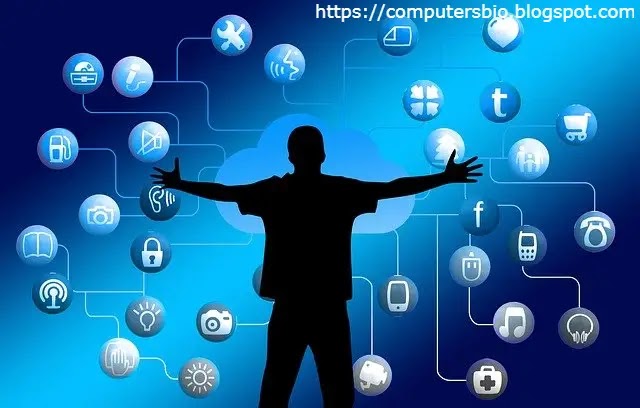Basic Internet Terminologies
We often work on the Internet. While doing work, we need to know the words related to the internet. In this section we are discussing some important words related to the internet.
 |
1. Internet
an internal network that is limited to a particular area and uses the same Internet standards.
2. URL
URL It stands for Uniform Resource Locator. This is the address of a resource available on the Internet. URL by web browser It is used to locate internet resources. url Determines the protocol used to access the resource (eg itp: for a site). Along with this, it also decides on which server the resource is located, as information resource related to the President of India is available on www.presidentofindia.nic.in.
3. Browser
Browser is a software that allows the user to download H.T. ml. Helps in viewing documents and accessing files and software related to those documents.
4. Domain
domain is a set of websites on the Internet that end on the same set of letters. For example, .com refers to the commercial type of sites, while organization refers to the category of sites. The domain is the last part of the ads.
5. Domain Name
domain name is a name that identifies a website and groups of websites on the Internet.
6. Domain Name System
Domain Game System, abbreviated as DNS. A hierarchical system by which Internet hosts receive domain name ads (such as www.sify.com) and IP addresses (such as 210.18.12244).
7. Hyperlink
hyperlink is a combination of an element of a hypertext document, such as a word, phrase, symbol or figure, with another document, file, or script. The user activates the link by clicking on a linked element that is actually underlined or different from the text color of the rest of the document. This is done so that the user can know that it is a linked element. When the pointer changes to a hand, you are pointing to a hyperlink.
8. Hypertext
text stored in computer systems that contains links and helps the user to move from one text or document to another.
9. Hypermedia
a system that combines text with files containing images, sound or video.
10. Freeware
is a type of computer software that is provided free of charge on the Internet.
Also Read :
11. Shareware
is a type of computer software that is given to the user free of cost for testing, but after a time limit, they have to buy it.
12. Spyware
is software that is downloaded secretly with the software and collects your personal information such as which websites you use and what information you fill in an online form And using this information creates a profile without your consent.
13. Blog
an abbreviation for weblog. It is a type of website where entries are made and displayed in reverse chronological order such as in a journal or diary. Blogs often provide commentary or news on a specific topic such as food, politics, or local news. Some blogs function as more personal online diaries.
A typical blog would contain text, figures, and links to other blogs, web pages, and other media related to the topic. Huh. Most blogs are primarily textual. Although some also focus on photo blog, video (vlog) audio (podcasting) and are part of a wider network of social media."
14. website
a place connected to the Internet where A company or organization or any individual can hold information
15. Web page
A web page is a document that is connected to the World Wide Web and can be viewed using any Internet connection. it is a part.
16. Home page
was created by a company, organization, etc. on the homepage of the Internet is the main page from which are made a combination (connection) to the other pages. or, the home page on the Internet that page which you choose as the first page that appears after you connect to the Internet on your screen.
17. Protocol
protocol is a set of rules that govern the way the law between the computers Data is sent
18. Search Engine
A search engine is a computer program that Searches for information on the Internet, especially documents that contain a particular word or group of words.
19. Server
A server is a computer program that controls or sends information to a number of computers connected to a network. Or, the server is the main computer on which the server program is run. In short, what a computer gives or offers is called a server.
20. Host
the main computer of a network that controls and sends information to other computers connected to it.
21. Client
A client is a computer that is connected to a server. In other words, a client is a computer that receives services from a server.
22. Hacker
A hacker is a computer enthusiast who views or changes the information of someone else's computer system without permission.
23. Cracker
A cracker is a person who, after gaining control over the security measures of a computer system, obtains unauthorized access to that system, obtains information illegally or uses computer resources illegally. Uses it to achieve its wrong objectives.
24. Download
is the process of transferring data from a large computer to a small computer system. Or, it is the process of data transfer from server to client.
25. Upload
is the process of transferring data from a small computer to a large computer system. Or, it is the process of data transfer from client to server.
26. Portal
is an electronic portal that means portal. An electronic portal is a website that provides information related to the purchase and sale of goods or it facilitates e-commerce. For example, yahoo provides facilities such as promotions, reservations, auctions and participating in contests.







1 Comments
Nice article 👍
ReplyDeletePlease do not enter any spam link in the comment box.